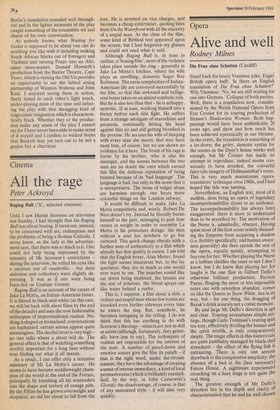Opera
Alive and well
Rodney Milnes
Die Frau ohne Schatten (Cardiff) Stand back for hoary Viennese joke. Eager British opera buff; 'Is there an English translation of Die Frau ohne Schatten?' Wily Viennese: 'No, we are still waiting for one into German.' Collapse of both parties. Well, there is a translation now, commissioned by the Welsh National Opera from Eric Crozier for its touring production of Strauss's Shadowless Woman. Both happenings 'would have been unthinkable 20 years ago, and show just how much has been achieved operatically in our lifetime. In the event, the translation is something of a let-down; the gritty, demotic syntax for the scenes in the Dyer's house works well enough, but Mr Crozier has made no attempt to reproduce, indeed seems consciously to have avoided, the colourful fairy-tale imagery of Hofmannsthal's verse. This is very much mainstream operatranslators' technique circa 1960s, and I had hoped the tide was turning.
Nevertheless, an English text, most of it audible, does bring an opera of legendary incomprehensibility closer to an audience. The incomprehensibility has always been exaggerated: there is more to understand than to be mystified by: The motivation of the Nurse is, admittedly, obscure. Having spent most of the first scene noisily dissuading the Empress from acquiring a shadow (i.e. fertility specifically, and human awareness generally) she then spends the rest of the opera, equally noisily, attempting to buy one for her. Whether playing the Nurse as a lesbian clarifies the issue or not I don't know, but I do know that playing her for laughs is the one flaw in Gilbert Deflo's otherwise brilliant production. Patricia Payne, flinging the more or less impossible notes out with relentless abandon, comes on like the Queen in Snow White, fun in its way, but — for one thing, the drugging of Barak's drink is surely not a comic moment.
By and large Mr Deflo's direction is apt and clear. Touring necessitates simple settings, though Carlo Tommasi's rearing split tea-tray, effectively dividing the human and the spirit worlds, is only comparatively simple. The magic effects in this eastern tale are quite justifiably managed by black-clad attendants — the effect of the flying fish is entrancing. There is only one serious drawback to the comparative simplicity: the absence of a bed in the (less necessary) Falcon House. A nightmare experienced crouching on a bare stage is not quite the real thing. The greatest strength of Mr Deflo's direction lies in the depth and clarity of characterisation that he and his well chosen cast have managed between them. Pauline Tinsley's Frau is the performance of a lifetime. Her voice, a gleaming sword at the top, lusciously coloured at the bottom, has never sounded more expressive. A German critic has recently hailed her as one of the leading Strauss sopranos of the day. We know, we know, but it is good to have it confirmed from her home territory. Just as impressive was the way Miss Tinsley delved beneath the prickly surface of the character, finding the inarticulate discontent, the hidden misery and frustration. This is a profoundly moving interpretation, Norman Bailey was of course born to sing Barak. In warm voice, he caressed the arching phrases with infinite tenderness, and his impersonation of the simple artisan Wholly avoided the mawkish. Anne Evans, understandably nervous at first (she oversang her opening scene), soon settled down and matched Miss Tinsley in a generous out-pouring of warm soprano tone. Matti Kastu was an uncommonly expressive Emperor and his English, if not wholly Idiomatic, was certainly clear.
Presiding over all was Richard Armstrong. Not since Bifihm and Kempe, and certainly not at the lumpish performances at the Garden, have I heard the subtle colouring and the overwhelming power of this score realised with such sympathy, understanding and patent relish. The Orchestra, always good, surpassed itself. The whole undertaking was ambitious, as fraught with difficulties, and as successful as the Garden's Lulu, Quite a week: opera is alive and well.







































 Previous page
Previous page